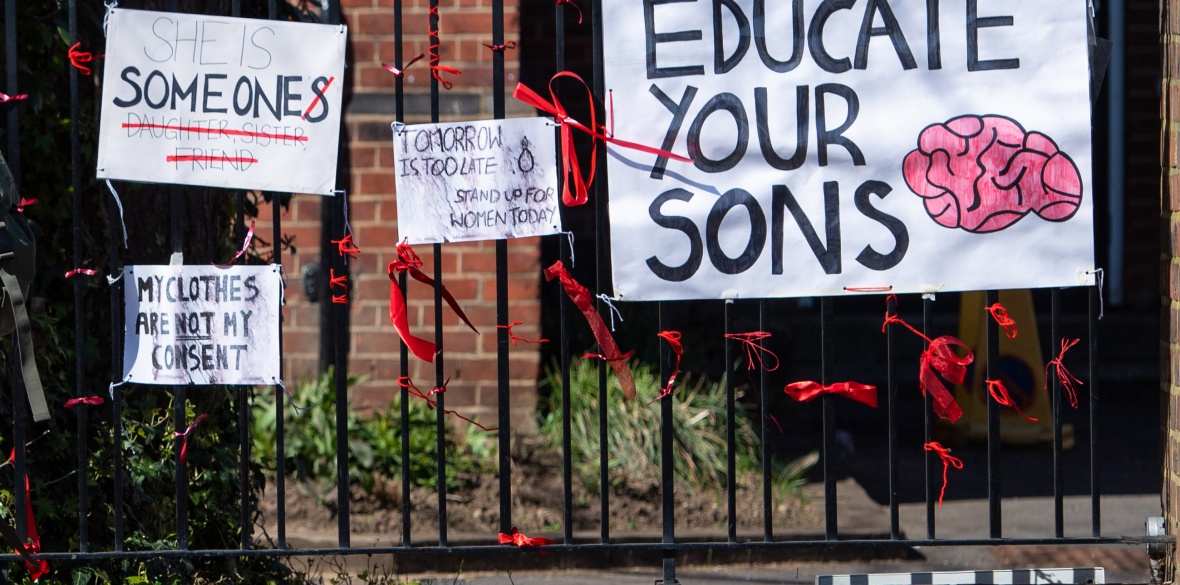This is the last article you can read this month
You can read more article this month
You can read more articles this month
Sorry your limit is up for this month
Reset on:
Please help support the Morning Star by subscribing here
IN MARCH 2021, a website, Everyone’s Invited, exposed the shocking and widespread nature of sexual harassment in schools and colleges across Britain.
Since then, thousands of young women and girls have spoken out about their experiences of sexual harassment in schools, colleges and universities and demanded change.
To date, over 50,000 testimonies from survivors of abuse have been posted on the website, with numbers increasing all the time.
These testimonies come at a moment of heightened awareness of violence against women and girls (VAWG) following the murder of Sarah Everard and the substantial reporting of rises in domestic abuse and other forms of VAWG throughout the Covid-19 pandemic.
For many organisations, including the NEU, the testimonies from Everyone’s Invited are shocking but not surprising.
Back in 2017, the NEU published a report “It’s Just Everywhere” highlighting the widespread nature of sexism and sexual harassment in schools.
We found that over a third of girls in mixed-sex schools reported that they had personally experienced some form of sexual harassment at school.
Nearly one quarter had been subjected to unwanted physical touching of a sexual nature.
Gender stereotyping and discrimination were also witnessed frequently. For example, a quarter of secondary school teachers reported that they witnessed gender stereotypes on a daily basis. This rose to a third of primary school teachers.
It is clear that girl’s experiences of sexual harassment in schools and colleges are normalised and fuelled by harmful gendered stereotypes.
As one female student put it, “Guys think it’s OK to touch girls whenever they like.”
Unsurprisingly, it is not just students who experience sexual harassment but education staff too and disproportionately women staff.
A recent survey by TES found that one in four female secondary teachers have been sexually harassed or abused in the past year.
This can have a devastating impact on women’s work, wellbeing and health and safety in the workplace.
The impact of experiencing sexual harassment and abuse is compounded by the fact that many female staff don’t feel able to report incidents or feel they would have the support of colleagues to address sexual harassment — whether the harasser is another colleague or a student.
Too often a lack of clear policies and procedures in schools undermines efforts to take robust and effective action.
All of the above evidence demands that we do more to promote the education and rights of women and girls.
It is why the NEU is calling on Congress to take action. This starts with recognising that sexual harassment is a trade union issue.
Trade unions have a vital role to play in raising awareness about sexism and sexual harassment in society and in schools and why this is harmful.
Trade unions should also be a significant source of support for any worker who has experienced sexual harassment, including helping workers to report incidents and ensure that they are addressed robustly.
Importantly, and most challengingly, trade unions have a key role to play in changing the culture of workplaces and ensuring that sexual harassment is never accepted, treated as “banter” or minimised or trivialised.
With the government recently announcing that it will introduce a duty on employers to protect staff from sexual harassment at work and protect workers harassed by clients or customers, as well as colleagues, the NEU believes the time to act is now.
The TUC and every union must now make sure that this preventative duty is introduced as soon as possible and is enforced effectively.
We must also continue to support trade union reps and members to share and build on promising practice and what works to stop sexual harassment in the workplace.
Crucially, if we want to change the experiences of the next generation of workers, children and young people, we must seek to change our education system.
For too long, the government has not taken the issue of sexual harassment in schools and colleges seriously or provided teachers and school staff with the necessary professional development to tackle this behaviour (in our research just one in five secondary school teachers surveyed had received training in recognising and tackling sexism as part of initial teacher education, and only 22 per cent of secondary school teachers received continuing professional development).
It has taken decades of campaigning by the NEU and a wide range of campaigners to finally make relationships education statutory in primary schools and relationships and sex education (RSE) statutory in schools in England alongside “health education.”
Like the recent changes to employer’s duties, the new statutory relationships, sex and health education provides an important opportunity to prevent sexual harassment in schools — through educating young people about all forms of VAWG and giving students the skills to form healthy, enjoyable and consensual relationships.
We must act now to build on these hard-fought wins, harnessing the activism of girls, young women and trade unionists to ensure that the government goes further, invests in education and gives staff the training, time and resources needed to prevent and respond to sexual harassment in every school and college.
Dr Mary Bousted is joint general secretary of the NEU.









